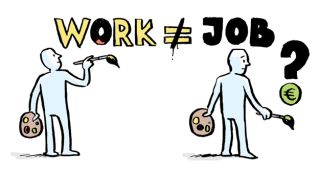Recognising All Work

A major question raised by the current labour-market situation concerns assumptions underpinning culture and policymaking in this area. The priority given to paid employment over other forms of work is one such assumption. Most people recognise that a person can be working very hard outside a conventionally accepted “job”. Much of the work carried out in the community and in the voluntary sector comes under this heading. So too does much of the work done in the home. Social Justice Ireland’s support for the introduction of a basic income system comes, in part, because it believes that all work should be recognised and supported.
During the recession Government funding for the Community and Voluntary sector reduced dramatically and this has not, as yet, been restored. It is essential that Government appropriately resource this sector into the future and that it remains committed to the principle of providing multi-annual statutory funding. The introduction of the Charities Regulatory Authority, the Governance Code and the Lobbying Register in recent years is intended to foster transparency and improve public trust. However, it is essential that the regulatory requirements are proportional to the size and scope of organisations, and do not create an unmanageable administrative burden which detracts from the core work and deters volunteers from getting involved.
In August 2019, the Department of Rural and Community Development published Sustainable, Inclusive and Empowered Communities: A Five-Year Strategy to Support the Community and Voluntary Sector in Ireland 2019-2024 (Department of Rural and Community Development, 2019). This Strategy sets out the vision for community and voluntary sector development over the next five years. It contains a series of 11 policy objectives across all stakeholders, from Public Participation Networks to civil society organisations to local and national Governments.
The Community Services Programme works to tackle disadvantage by providing supports to community-based organisations that enables them to deliver social, economic and environmental services, with a particular focus an areas that, by virtue for geographical isolation or social isolation or have too low a level of demand to satisfy market led providers. The groups in receipt of these services may not otherwise have any access.
Social Justice Ireland recommends that implementation of the five year Strategy be resourced in a way that recognises the important role of the Community and Voluntary Sector, the local role of the PPNs, and the challenges of community development, and seeks to generate real partnerships between communities and agencies. We further urge Government to publish the Volunteering Strategy which was being developed in tandem with the Strategy and the Social Inclusion Strategy so as to ensure policy coherence across all three strategies.
Acknowledging the Work of Carers
The work of Ireland’s carers receives minimal recognition despite the essential role their work plays in society. Results from the 2016 Census offered an insight into the scale of these commitments, which save the state large costs that it would otherwise have to bear.
Census 2016 found that 4.1 per cent of the population provided some care for sick or disabled family members or friends on an unpaid basis. This figure equates to 195,263 people. The dominant caring role played by women was highlighted by the fact that 118,151 (60.5 per cent) of these care providers were female[1]. When assessed by length of time, the census found that a total of 6,608,515 hours of care were provided by carers each week, representing an average of 38.3 hours of unpaid help and assistance each. Two thirds of this volume of care was provided by female carers. Using the minimum wage as a simple (if unrealistically low) benchmark to establish the benefit which carers provide each year suggests that Ireland’s carers provide care valued at more than €3.4bn per annum[2].
Social Justice Ireland welcomed the long overdue publication of a National Carers Strategy in July 2012 (Department of Health, 2012). The document included a ‘roadmap for implementation’ involving a suite of actions and associated timelines, and identifies the Government Department responsible for their implementation. However, these actions were confined to those that could be achieved on a cost neutral basis. Various progress reports of the strategy have been published to date and point towards some progress on the actions set out. However, these are, as a group, limited given the unwillingness of Government to allocate sufficient resources to supporting those in this sector.
Social Justice Ireland believes that further policy reforms should be introduced to reduce the financial and emotional pressures on carers. In particular, these should focus on addressing the poverty experienced by many carers and their families alongside increasing the provision of respite care for carers and for those for whom they care. In this context, the 24 hour responsibilities of carers contrast with the improvements over recent years in employment legislation setting limits on working-hours of people in paid employment.
Social Justice Ireland believes that government should recognise, in a more formal way, all forms of work. We believe that everyone has a right to work, to contribute to his or her own development and that of the community and wider society. We also believe that policymaking in this area should not be exclusively focused on job creation. Policy should recognise that work and a job are not always the same thing.
[1] A CSO QNHS special module on carers (CSO, 2010) and a 2008 ESRI study entitled ‘Gender Inequalities in Time Use’ found similar trends (McGinnity and Russell, 2008:36, 70).
[2] Calculation based on 2016 minimum wage of €9.15 per hour.
References
Department of Health (2012) National Carers Strategy. Department of Health.
Department of Rural and Community Development (2019) Sustainable, Inclusive and Empowered Communities: A Five-Year Strategy to Support the Community and Voluntary Sector in Ireladn 2019-2024